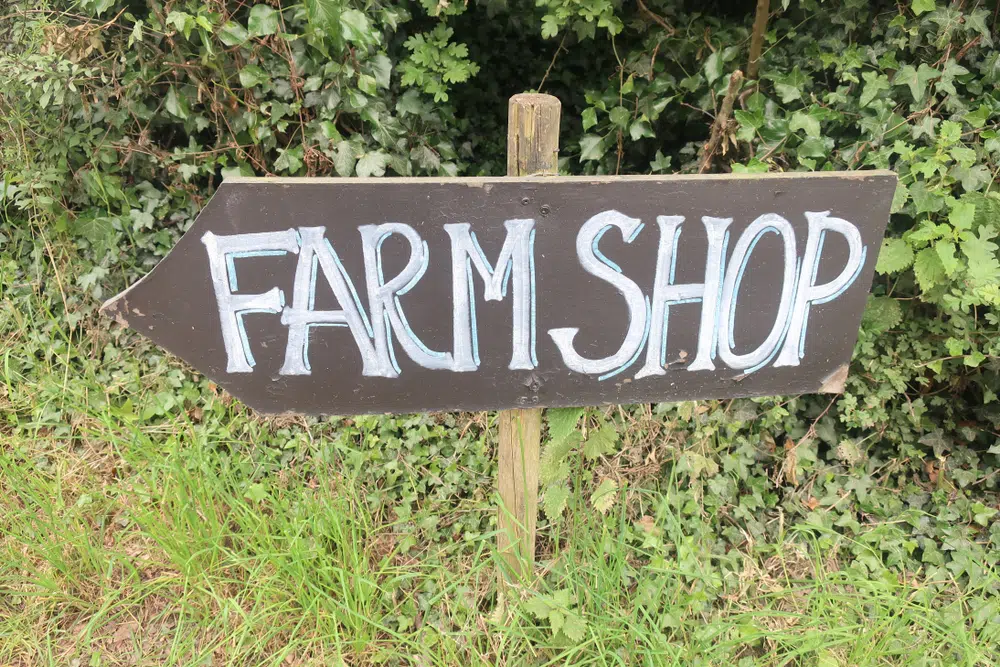 Starting a farm shop is a dream of many small business owners who want to bring the freshness and flavors of locally sourced foods to their community. They can focus on buying small-batch and sustainable products from trusted sources, while at the same time providing customers with an experience more memorable than just another trip to the supermarket.
Starting a farm shop is a dream of many small business owners who want to bring the freshness and flavors of locally sourced foods to their community. They can focus on buying small-batch and sustainable products from trusted sources, while at the same time providing customers with an experience more memorable than just another trip to the supermarket.
To ensure success, business owners should research the area for competitor businesses, consider the range of products they can offer, estimate start-up costs, consider securing grants or loans if necessary, and create a presence online through social media marketing. Building relationships with local producers, suppliers and customers ensures that farm shops become popular destinations for great tasting food as well as help support local farmers in their production efforts.
While some farm shops only sell produce, others also sell meat, dairy, and other items sourced from local producers. Farm shops are a great way to support local businesses and reduce your carbon footprint. In addition, the produce sold at farm shops is often higher quality than what you would find at a supermarket. If you’re looking for fresh, local food, a farm shop is the place to go.
You can help to support your local community by setting up a farm shop and selling locally produced food items. For everything you need to know, read through the following useful guide.
How to open a successful farm shop
If you’re passionate about farm-fresh food and want to start your own business, then a farm shop could be the perfect opportunity for you. Of course, running a successful farm shop takes more than just having good product – it takes careful planning, marketing savvy, and a whole lot of hard work. Here are a few tips to help you get started on the right foot:
1. Do your research. Visit other farm shops in the area and take note of what’s working well for them. What products are selling well? What do customers seem to be looking for? This information will be invaluable as you plan your own farm shop.
2. Stock high-quality products. Your customers will be coming to you for fresh, delicious food, so make sure that’s exactly what you’re offering. Work with local farmers and producers to source the best possible products for your shop.
3. Create a strong marketing strategy. Spread the word about your farm shop through advertising, social media, and word-of-mouth. Make sure potential customers know what makes your shop special and why they should visit you.
With these tips in mind, you’ll be well on your way to opening a successful farm shop of your own!
Estimating demand
Make sure your proposed farm shop will be able to meet the local demand. To begin with, check out the competition and see if there are any existing farm shops nearby. For example, farmers markets and delicatessens that sell similar products have a similar ‘feel’. Stores that sell fresh produce in addition to supermarkets, greengrocers, market stalls, and convenience stores are not obvious direct competitors. The success of your farm shop could be almost unaffected by these types of outlets, or they could prove to be major competitors depending on what you sell.
To achieve the turnover you need, you must attract a certain number of customers. Do you have enough customers locally or will you need to attract customers from elsewhere? During the holiday season, will you be able to tap into the tourist market if you live in a tourist area?
You might be able to supply other local businesses in addition to selling directly to individual customers. If you would like to supply fresh vegetables, organic produce, or local specialties to local restaurants and hotels, please contact them.
Through online sales and mail order, some farm shops target a national customer base (for example, cured meats or special cheeses). The estimation of sales in this case is challenging – careful marketing will be needed and sales can take time to build up, so your initial estimations shouldn’t be based only on them.
Shop location
Passing trade typically benefits farm shops less than other shops. In terms of location, you probably won’t have much choice, as your shop will likely be on the farm. Nevertheless, you may have some flexibility regarding the location of the shop on the farm grounds.
It should be easy to find the shop. A well-marked and easy access will encourage passers-by to stop. It will be helpful if there are parking facilities close to the shop or outside the shop. Signage should be clear and attractive.
There may be less competition from other outlets the further away you are from large cities and towns, but the local customer base will also be smaller. However, if the products and service are good enough, people might be willing to travel considerable distances to a farm shop. Your shop may attract more customers if you offer local specialties, organic produce, or your own unique products.
Farmers’ shops tend to serve higher-income customers, according to research. It is often hard for multiple supermarkets to provide good quality food and produce with low ‘food miles’ to customers looking for a helpful and efficient service. This type of customer may be easier to attract if your farm shop is located in an affluent area. Your sales might need to be built up over a wider area if you live in a less well-off part of the country.
Understand your competitors
Your shop should be chosen by enough customers over other food outlets. Locally grown vegetables and organic meat may be among the items your shop appeals to customers who supplement their weekly supermarket shopping.
Additionally, holidaymakers seeking a ‘taste’ of the area may find it popular. You are likely to compete with other farm shops in your area, as well as shops similar to yours in nature, such as delicatessens, rather than more mainstream food outlets.
Make sure you visit all of these competitors. Look around to see what kind of goods they sell and what kind of image they portray. Take note of:
- Their product line
- Their prices
- If they sell organic produce
- The opening hours
- What type of customer they attract
- Modernity and smartness of the premises and fittings
- The level of service they provide
To record the results of your research, you might find it useful to print out a competitor research form.
If you survey your local competitors, you might discover that none of them stock organic produce, and you can fill this gap in the market. Your own recipe sausages, for example, or marinated spareribs ready to barbecue could be something you can sell that isn’t available anywhere else. The ability to specialise like this can help your shop stand out from the competition, attracting customers, especially if you are able to find a best-seller that customers recommend to their friends.
You can attract customers by emphasising the quality of your food if you cannot find a niche in the market or a way to specialise. Following the various food scandals that have been exposed in recent years, people have become more concerned about food safety and quality. People will find it very appealing to talk with the person who has produced or sourced the food locally. It is also likely to help you to attract and retain customers if you provide a welcoming atmosphere and high quality service.
Who are your likely customers?
It is likely that most of your customers are private individuals who live locally, but you might also have customers who are:
- Taking a day trip or longer vacation in your area. Tourists often visit farm shops for shopping
- Especially if your store is located near a busy road, passing through your area
- Trade terms with local businesses such as restaurants and hotels
You could attract customers from further afield if you sell niche products and establish yourself as a source for a local specialty or produce your own line of goods on the farm. Consider selling this type of product online or through classified advertisements in magazines like Farmers Weekly.
Check out local developments
You may want to find out if any plans are being made to build new road systems that will bypass your farm shop. Look into the possibility of starting a farmers’ market in your area as well. If you take a stall at such a market, you might find that it leads to additional sales and that it is a great way to advertise your business.
Decide what to sell
The range of goods you sell may be entirely determined by the products produced on your farm if your farm shop is a diversification project. As an alternative to producing your own food, you may decide to purchase some from local farms or other suppliers.
In addition to fresh goods, you might also sell frozen, fresh, and cooked products. The only organic produce you sell may be what you decide to sell.
The majority of your income will likely come from the sale of food, but you might also sell other items.
Creating the right image
Having the right image for your shop is crucial. Farm shops are expected to provide a distinctive shopping experience that differs from those found in the High Street or supermarkets. It is imperative that you and your staff are able to answer questions about the products sold in your farm shop, since customers typically appreciate your personal involvement in the production and/or sourcing process.
First impressions matter, so the shop’s design should reflect its close ties to agriculture. Buildings and settings play a significant role in creating the right image for a shop. It is possible, for example, to retain much of the rural character of converted farm buildings that have been carefully updated. Using natural materials like wood and stone can make the interior look clean and bright. Clean and easy-to-read signs should be used.
Layout and presentation of the food are also very important. For displaying goods, farmhouse furniture and wicker baskets are ideal. Allow people to browse freely inside the shop by keeping it spacious. When designing your shop layout, you may want to engage the services of a retail specialist.
You will be listed on the Farm Retail Association’s online map, which allows people to search for farmers’ markets and farm shops by location.
Advertising your shop
You must ensure that your potential customers are aware of your shop and the products you offer, regardless of its characteristics.
It’s very effective to receive recommendations from friends and family, but it’s a slow process. You may need to advertise to your potential customers in order to promote your shop. Advertisements on local radio, in newspapers and magazines, and leaflet drops can all increase awareness of your shop. However, they cost money, so you will have to decide whether the potential benefits are worth it.
Posters and signs are inexpensive and can be effective. You can start building a customer base by taking a stall at a local farmers’ market – make sure you provide information about your shop on the stall.
It can be particularly helpful if you plan to stock unusual or unique products if you have a web page to advertise your business and sell your products online.
Additional attractions
In order to encourage people to visit your farm, you may want to have additional attractions. You might consider setting up a tearoom adjacent to the shopping area, which customers could use after shopping. When they are in season, many farms with a shop also offer pick-your-own fruit and vegetables. In addition to farm tours and nature trails, you might consider providing such attractions. They have proven to be very popular at some farms and generally generate a lot of interest.
Price your products
Instead of purely looking at price, people will visit your shop because of the quality and experience of shopping in a different environment. Customers will know that farm shops sell fresh, locally sourced, high-quality goods and they will be willing to pay accordingly.
In spite of this, it is essential that your goods represent value for money, which is why many farm shops price their unprocessed products around supermarket prices. If you sell organic produce or locally made products, you can also charge more than your competitors if they sell similar, mass-produced items.
Pricing correctly is very important. Your operating costs, including your own drawings, must be covered by the difference between the cost price and the selling price.
Read more: Sector trends for farm shops in the UK
Giving special offers and discounts
It might be a good idea to run occasional special offers. A vegetable box scheme may offer half-price trial boxes, or restaurants may qualify for discounts if they purchase in bulk. You can attract more customers by offering pick-your-own fruit. Staff, regular customers, family members, and friends often receive discounts in many shops.
Check out the local competition for ideas and make sure any special offers you make are working for you. Promotions of this kind might encourage extra sales, but they will also affect your profit margin.
Help for farm shop businesses
Farm shops do not have specific training courses available, but the Farm Retail Association (formerly FARMA) offers management support and technical briefings.
There may be relevant qualifications available for certain areas of the business, such as training for butchers if you plan to sell raw meat or fishmongers if you intend to sell wet fish, depending on the products you plan to sell.
Additionally, hundreds of general business management and retail courses are available. The retailing sector offers a variety of general vocational qualifications covering topics such as health and safety, security, stock handling, and customer service
Buy and existing business
Buying a farm shop from someone who’s already running it can be the best option for you. You won’t need to start from scratch and build up your business, because they are established in their community with all of this equipment that will save time on having to invest into things yourself later down the line!
Buying a business can be hazardous and expensive if you don’t have the right skills on your team. You should establish financial stability, so that when it’s time to buy businesses remember how much they are worth in order not get caught with an overpriced company!
Read more: Legal issues farm shop business face
Conclusion
Starting a farm shop in the UK can be a great business opportunity for those willing to take the risk. This task will involve researching local markets, selecting suitable produce and setting up a shop that meets local regulations. Running a farm shop also offers up an array of marketing techniques which can be utilised to reach new customers and maintain existing ones. It is important to plan ahead, as ongoing sales will depend on having a steady supply of produce and properly educating potential customers on what they can expect from their shopping experience. There are many possibilities with a farm shop in the UK – it’s just a matter of deciding upon the right course of action.
Jarred Musson is a versatile writer with a diverse educational background and a passion for all things business. Holding a Master of Science (MSc) degree in Marketing and a Bachelor of Arts (BA Hons) in Multimedia Journalism from Manchester Metropolitan University, Jarred possesses a unique blend of expertise that allows him to dissect and communicate complex business topics with clarity and precision.


